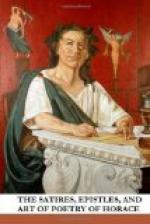Why hail me poet, if I fail to seize
The shades of style, its fixed proprieties?
Why should false shame compel me to endure
An ignorance which common pains would cure?
A comic subject steadily declines
To be related in high tragic lines.
The Thyestean feast no less disdains
The vulgar vehicle of comic strains.
Each has its place allotted; each is bound
To keep it, nor invade its neighbour’s ground.
Yet Comedy sometimes will raise her note:
See Chremes, how he swells his angry throat!
And when a tragic hero tells his woes,
The terms he chooses are akin to prose.
Peleus or Telephus, suppose him poor
Or driven to exile, talks in tropes no more;
His yard-long words desert him, when he tries
To draw forth tears from sympathetic eyes.
Mere grace is not enough: a play should thrill
The hearer’s soul, and move it at its will.
Smiles are contagious; so are tears; to see
Another sobbing, brings a sob from me.
No, no, good Peleus; set the example, pray,
And weep yourself; then weep perhaps I may:
But if no sorrow in your speech appear,
I nod or laugh; I cannot squeeze a tear.
Words follow looks: wry faces are expressed
By wailing, scowls by bluster, smiles by jest,
Grave airs by saws, and so of all the rest.
For nature forms our spirits to receive
Each bent that outward circumstance can give:
She kindles pleasure, bids resentment glow,
Or bows the soul to earth in hopeless woe;
Then, as the tide of feeling waxes strong,
She vents it through her conduit-pipe, the tongue.
Unless the speaker’s words and fortune suit,
All Rome will join to jeer him, horse and foot.
Gods should not talk like heroes, nor again
Impetuous youth like grave and reverend men;
Lady and nurse a different language crave,
Sons of the soil and rovers o’er the wave;
Assyrian, Colchian, Theban, Argive, each
Has his own style, his proper cast of speech.
In painting characters, adhere to fame,
Or study keeping in the type you frame:
If great Achilles figure in the scene,
Make him impatient, fiery, ruthless, keen;
All laws, all covenants let him still disown,
And test his quarrel by the sword alone.
Still be Medea all revenge and scorn,
Ino still sad, Ixion still forsworn,
Io a wanderer still, Orestes still forlorn.
If you would be original, and seek
To frame some character ne’er seen in Greek,
See it be wrought on one consistent plan,
And end the same creation it began.
’Tis hard, I grant, to treat a subject known
And hackneyed so that it may look one’s own;
Far better turn the Iliad to a play
And carve out acts and scenes the readiest way,
Than alter facts and characters, and tell
In a strange form the tale men know so well.
But, with some few precautions, you may set
Your private mark on public chattels yet:
Avoid careering and careering still
In the old round, like carthorse in a mill;
Nor, bound too closely to the Grecian Muse,
Translate the words whose soul you should transfuse,
Nor act the copyist’s part, and work in chains
Which, once put on by rashness, shame retains.




